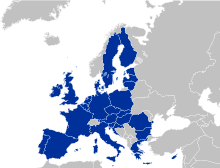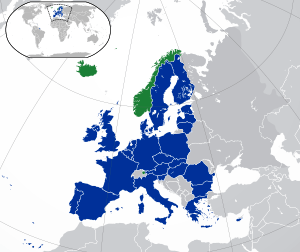President of the European Parliament
The President of the European Parliament presides over the debates and activities of the European Parliament. They also represent the Parliament within the EU and internationally. The president's signature is required for enacting most EU laws and the EU budget.
Presidents serve two-and-a-half-year terms, normally divided between the two major political parties. Until 2018, there have been thirty presidents since the Parliament was created in 1952, fifteen of whom have served since the first Parliamentary election in 1979. Two presidents have been women and most have come from the older member states. The current president is Antonio Tajani from Italy.
Role in Parliament
The president chairs debates and oversees all the activities of the Parliament and its constituent bodies (ensuring the Parliament's rules of procedure are applied), in this the role is similar to that of a speaker in a national parliament. Below the president, there are 14 vice-presidents who chair debates when the president is not in the chamber. The president also chairs the meetings of the Bureau, which is responsible for budgetary and administration issues, and the Conference of Presidents, which is a governing body composed of the presidents of each of the parliament's political groups.[2][3]
Position in the Union
The president represents Parliament in all legal matters and external relations, particularly international relations. When the European Council meets, the president addresses it to give the Parliament's position on subjects on the Council's agenda. The president also takes part in Intergovernmental Conferences on new treaties. The president's signature is also required for the budget of the European Union and Union acts adopted under codecision procedure to be adopted. The president also chairs conciliation committees with the Council under these areas.[2][3]
In most countries, the protocol of the head of state comes before all others. However, in the EU the Parliament is listed as the first institution, and hence the protocol of its president comes before any other European, or national, protocol. The gifts given to numerous visiting dignitaries depends upon the president. President Josep Borrell MEP of Spain gave his counterparts a crystal cup created by an artist from Barcelona which had engraved upon it parts of the Charter of Fundamental Rights among other things.[4]
With the reorganisation of leading EU posts under the Lisbon Treaty, there was some criticism of each post's vague responsibilities. Ukrainian ambassador to the EU Andriy Veselovsky praised the framework and clarified it in his own terms: The President of the European Commission speaks as the EU's "government" while the President of the European Council is a "strategist". The High Representative specialises in "bilateral relations" while the European Commissioner for Enlargement and European Neighbourhood Policy deals in technical matters such as the free trade agreement with Ukraine. The Parliament's president meanwhile articulates the EU's values such as democratic elections in other countries.[5]
Election

|
Six
Five |
Three
Two |
One
None |
The president is elected by the members of Parliament for a two-and-a-half-year term, meaning two elections per parliamentary term, hence two presidents may serve during any one Parliamentary term. Since the European People's Party and Party of European Socialists began co-operating in the 1980s, they have had a tradition of splitting the two posts between them. In practice this means, in 2004–2009 for example, that the People's Party supported the Socialist candidate for president and, when his term expired in 2007, the Socialists supported the People's Party candidate for president. This results in large majorities for presidents, although there are some exceptions: for example from 1999–2004, under a People's Party–Liberal deal, the president for the second half of the term was a Liberal, rather than a Socialist.[6]
Starting from the 2009–2014 session of the Parliament the outgoing president presides over the election of the new president, provided that the outgoing president is re-elected as an MEP. If the outgoing president is not re-elected as an MEP then one of the 14 vice-presidents takes up the role. While the outgoing president or vice president is in the chair, they hold all the powers of the president, but the only business that may be addressed is the election of the new president.[7]
Before the ballot nominations are handed to the chair who announces them to Parliament. If no member holds an absolute majority after three ballots, a fourth is held with only the two members holding the highest number of votes on the previous ballot. If there is still a tie following this, the eldest candidate is declared elected.[8]
A number of notable figures have been President of the Parliament and its predecessors. The first president was Paul-Henri Spaak MEP, one of the founding fathers of the Union. Other founding fathers include Alcide de Gasperi MEP and Robert Schuman MEP. The two female presidents were Simone Veil MEP in 1979 (first president of the elected Parliament) and Nicole Fontaine MEP in 1999, both Frenchwomen.[9] Jerzy Buzek, former Prime Minister of Poland and member of Solidarity Electoral Action, was elected as the first president from the central and eastern European countries which joined in the 2000s (more precisely, he is the first person from a country that joined the EU after 1986 to hold the post).
2009
The two major factions of the European Parliament, the EPP and the S&D, have reached a formal agreement to share the presidency under the 2009–2014 term. Under the agreement, Jerzy Buzek will be president in the first half of the term and a S&D member would be elected in the second half (2012–2014) of the term.[10] Martin Schulz (SPD, Germany), leader of the S&D group, was speculated as the likely nominee, and in the event he was elected on 17 January 2012.
Buzek's presidency is part of the usual People's Party – Socialist agreement to have one presidency each of the two during each parliament. For the 2009–2014 term Buzek gets the post for the first term of office of two and a half years, and someone from the Socialists will get it for the second.[11] The 2004-2009 parliamentary term saw a great amount of co-operation between the two groups following on from the 1999–2004 term which saw an EPP-ELDR alliance. The Socialist candidate will be Martin Schulz who was unanimously nominated by the group.[12] Diana Wallis (Liberal) and Nirj Deva (Conservative) have also announced candidacies.[13][14]
Meanwhile, Graham Watson, the leader of ALDE, stated he wished to challenge this system of carving up the post, and presented himself as a candidate. He made a point of running a public campaign, to contrast against the closed-doors agreement of Peoples Party-Socialists, which he claimed was the first such campaign to be run. Through this, he also stated he hoped to open up a debate on the role of the president and make the figure more dynamic, to counterbalance the growing power of the Presidency of the Council of the European Union.[15] However, on 8 July 2009 Watson announced that he withdrew his candidacy thus leaving Buzek with only one opponent. The other official candidate was Eva-Britt Svensson, nominated from EUL-NGL.[16] She campaigned with the slogan "a different voice". She was the first MEP from Sweden to candidate to the position.
In the first vote of the new Parliament Jerzy Buzek (EPP, Poland) was elected Parliament president, winning with 555 votes to 89 votes over his opponent Eva-Britt Svensson (EUL-NGL, Sweden).[17]
2017
At the end of Martin Schulz's term, the presidency for the remainder of the eighth European Parliament (2014–2019) would have been due by convention to pass to an EPP member. However, the EPP–S&D agreement appeared broken, making it less certain that Antonio Tajani (EPP, Italy) would be elected president. The other contenders were Gianni Pittella (S&D, Italy), Guy Verhofstadt (ALDE, Belgium), Helga Stevens (ECR, Belgium), Eleonora Forenza (GUE/NGL, Italy) and Jean Lambert (Greens/EFA, UK).[18][19] On 17 January 2017, Tajani was elected after four rounds of voting, following the withdrawal of Verhofstadt and declaration of support for the EPP candidate by the ALDE.
Oldest member
Prior to 2009, the "oldest member", the eldest MEP (similar to the Father of the House), presided over the chamber during the election of the president rather than the previous president. The member had all the duties of president but the only business that could be addressed was the election of the president.[7]
In 2009, the Parliament's rules were changed so that the outgoing president (if re-elected as an MEP) or one of the outgoing vice-presidents would chair the first session of Parliament until a new president was elected.
List of office holders

The list below includes all presidents as far back as 1952. However official Parliamentary history does not see continuity between the Common Assembly and the post-1958 European Communities Parliamentary Assembly (the 50th anniversary of the European Parliament was celebrated in 2008, not 2002) so Jerzy Buzek would be the 24th president, not the 28th.
Presidents of the Common Assembly
| № | Name (Born–Died) |
Portrait | Term of office | Party | Group | Country | ||
|---|---|---|---|---|---|---|---|---|
| 1 | Paul-Henri Spaak (1899–1972) |
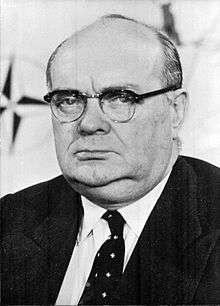 |
1952 | 1954 | BSP-PSB | SOC | ||
| 2 | Alcide De Gasperi (1881–1954) |
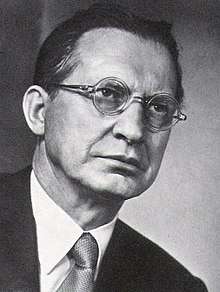 |
1 January 1954 | 19 August 1954[20] | DC | CD | ||
| 3 | Giuseppe Pella (1902–1981) |
 |
1954 | 1956 | DC | CD | ||
| 4 | Hans Furler (1904–1975) |
1956 | 1958 | CDU | CD | |||
Presidents of the Parliamentary Assembly
| № | Name (Born–Died) |
Portrait | Term of office | Party | Group | Country | ||
|---|---|---|---|---|---|---|---|---|
| 1 | Robert Schuman (1886–1963) |
1958 | 1960 | MRP | CD | |||
| 2 | Hans Furler (1904–1975) |
1960 | 1962 | CDU | CD | |||
Presidents of the appointed Parliament
| № | Name (Born–Died) |
Portrait | Term of office | Party | Group | Country | ||
|---|---|---|---|---|---|---|---|---|
| 1 | Gaetano Martino (1900–1967) |
 |
1962 | 1964 | PLI | LIB | ||
| 2 | Jean Duvieusart (1900–1977) |
1964 | 1965 | PSC-CVP | CD | |||
| 3 | Victor Leemans (1901–1971) |
1965 | 1966 | PSC-CVP | CD | |||
| 4 | Alain Poher (1909–1996) |
1966 | 1969 | MRP | CD | |||
| 5 | Mario Scelba (1901–1991) |
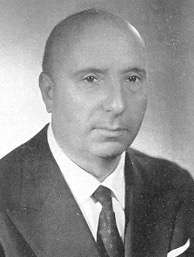 |
1969 | 1971 | DC | CD | ||
| 6 | Walter Behrendt (1914–1997) |
1971 | 1973 | SPD | SOC | |||
| 7 | Cornelis Berkhouwer (1919–1992) |
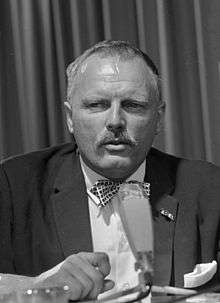 |
13 March 1973 | 10 March 1975 | VVD | LIB | ||
| 8 | Georges Spénale (1913–1983) |
1975 | 1977 | PS | SOC | |||
| 9 | Emilio Colombo (1920–2013) |
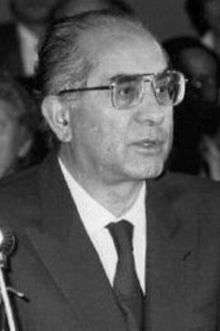 |
1977 | 1979 | DC | CD | ||
Presidents of the elected Parliament
| № | Name (Born–Died) |
Portrait | Term of office | Party | Group | Country | EP term | ||
|---|---|---|---|---|---|---|---|---|---|
| 1 | Simone Veil (1927–2017) |
.jpg) |
July 1979 | January 1982 | UDF | LD | 1st (1979–84) | ||
| 2 | Piet Dankert (1934–2003) |
 |
January 1982 | July 1984 | PvdA | SOC | |||
| 3 | Pierre Pflimlin (1907–2000) |
 |
July 1984 | January 1987 | UDF/RPR | EPP | 2nd (1984–89) | ||
| 4 | Henry Plumb (1925–) |
January 1987 | July 1989 | Con | ED | ||||
| 5 | Enrique Barón Crespo (1944–) |
 |
July 1989 | January 1992 | PSOE | SOC | 3rd (1989–94) | ||
| 6 | Egon Klepsch (1930–2010) |
.jpg) |
January 1992 | July 1994 | CDU | EPP | |||
| 7 | Klaus Hänsch (1938–) |
 |
July 1994 | January 1997 | SPD | PES | 4th (1994–99) | ||
| 8 | José María Gil-Robles (1935–) |
.jpg) |
January 1997 | July 1999 | PP | EPP | |||
| 9 | Nicole Fontaine (1942–2018) |
 |
July 1999 | January 2002 | UMP | EPP | 5th (1999–04) | ||
| 10 | Pat Cox (1952–) |
.jpg) |
January 2002 | July 2004 | Ind | ELDR | |||
| 11 | Josep Borrell (1947–) |
.jpg) |
July 2004 | January 2007 | PSOE | PES | 6th (2004–09) | ||
| 12 | Hans-Gert Pöttering (1945–) |
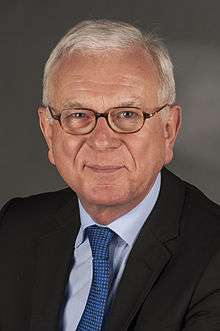 |
January 2007 | July 2009 | CDU | EPP | |||
| 13 | Jerzy Buzek (1940–) |
July 2009 | January 2012 | PO | EPP | 7th (2009–14) | |||
| 14 | Martin Schulz (1955–) |
 |
January 2012 | July 2014 | SPD | S&D | |||
| July 2014 | January 2017 | 8th (2014–19) | |||||||
| 15 | Antonio Tajani (1953–) |
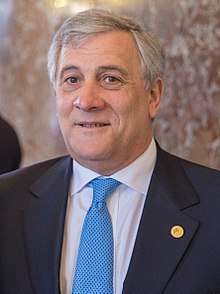 |
January 2017 | Incumbent | FI | EPP | |||
See also
References
- 1 2 Parliament began either in 1952 with the Common Assembly or 1958 with the Parliamentary Assembly.
- 1 2 "The President of the European Parliament". Europa (web portal). Archived from the original on 8 June 2008. Retrieved 19 November 2007.
- 1 2 "Duties of the President". European Parliament. Retrieved 12 June 2007.
- ↑ "Parliament's Protocol Service". European Parliament. 28 July 2006. Retrieved 28 October 2007.
- ↑ Rettman, Andrew (15 March 2010) Ukraine gives positive appraisal of new-model EU, EU Observer
- ↑ Settembri, Pierpaolo (2 February 2007). "Is the European Parliament competitive or consensual ... "and why bother"?" (PDF). Federal Trust. Retrieved 7 October 2007.
- 1 2 "Rules of Procedure of the European Parliament. Rule 11: Oldest member". European Parliament. Retrieved 12 June 2007.
- ↑ "Rules of Procedure of the European Parliament. Rule 13 : Election of President – opening address". European Parliament. Retrieved 22 November 2007.
- ↑ "Former E.P. Presidents". European Parliament. Retrieved 15 June 2007.
- ↑
- ↑ "Next EP president to be a Pole?". Brusselsblogger.blogactiv.eu. 2008-04-22. Retrieved 2017-01-16.
- ↑ "PES congratulate Martin Schulz on nomination for European Parliament Presidency". Retrieved 2011-12-03.
- ↑ "Wallis launches bid to be Parliament president". Retrieved 2011-11-30.
- ↑ "The man to stop Schulz?". Retrieved 2011-12-03.
- ↑ Watson, Graham (7 January 2009) Make me president: The next president of the European parliament should be a Lib Dem, and prove that not all Brits are anti-Europe, The Guardian
- ↑ "GUE-NGL Press Release". Guengl.eu. Retrieved 2010-03-15.
- ↑ "News on the Parliament Website". Europarl.europa.eu. Archived from the original on 22 July 2009. Retrieved 15 March 2010.
- ↑ "Surprise in the European Parliament: an election campaign". Politico. 12 January 2017.
- ↑ "All you need to know about the election of the new Parliament president". European Parliament. 13 January 2017.
- ↑ died in office
External links
- President of the European Parliament – Official Website
- Duties of the President europarl.europa.eu
- Presidents of the European Parliament European Navigator
- Results of Presidential elections 1979–2007


